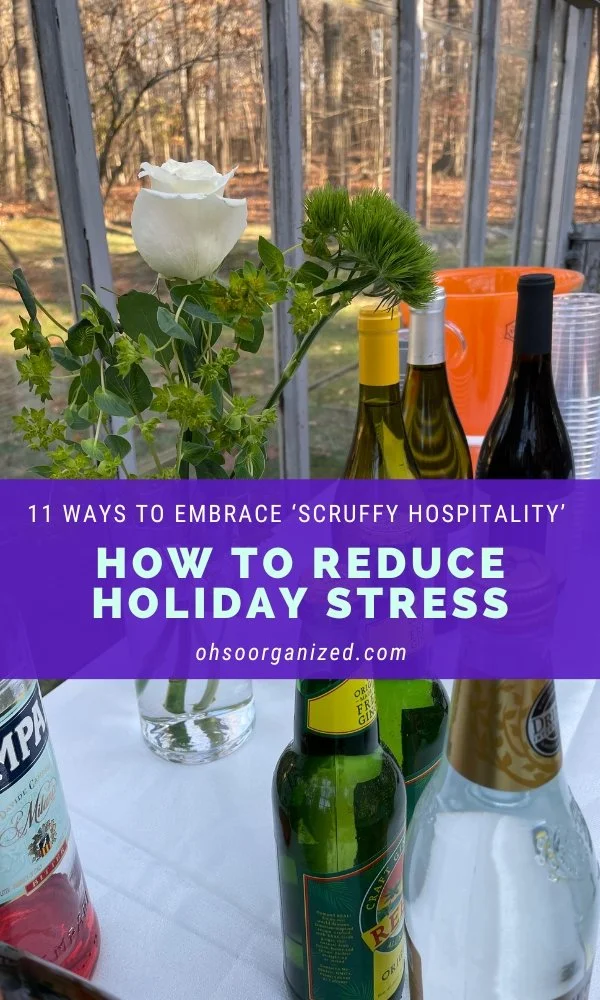Do you feel more stressed during the holiday season? What is the source? Holiday-related stress might revolve around travel planning, gift-giving, card-writing, decorating, over-committing, or entertaining.
As someone who enjoys and has hosted many gatherings, I continually work on reducing stress. Experience helps. The more I do something, the easier and less stressful it becomes, and the better I am at planning and navigating surprises. However, a more significant aspect is mindset. If I keep telling myself how stressed I am, what happens? I reinforce that feeling.
What is Scruffy Hospitality?
Recently, I heard about “scruffy hospitality,” which is a more relaxed approach to entertaining. It’s a practice and also a mindset. The idea is to prioritize connection and conversation over obsession with creating picture-perfect environments and Instagram-worthy meals. The concept includes having people over without cleaning up first and approaching food more simply. Instead of making elaborate dishes, ‘scruffy’ entertaining loves potlucks, leftovers, and takeout.
While “scruffy hospitality” was coined a decade ago by Jack King, an Anglican priest from Tennessee, it has received more attention in the last few years. It rejects unrealistic social media standards that create pressure on us to be “perfect hosts.” Scruffy hospitality is a nod to embracing imperfection and authenticity. These involve letting go.
For this holiday season, especially if you’re stressed, I encourage you to incorporate some ‘scruffy’ into your life. It will look different for each person. Consider how beneficial scruffy hospitality could be for reducing your stress.
As a seasoned host, ‘scruffy’ isn’t a term I naturally associate with entertaining. I like to clean and prepare. Don’t get me started on my to-do lists. I enjoy the visual aspect of decorating the tables, arranging flowers, and creating colorfully plated dishes. Those aspects aren’t stressful for me. However, those and other aspects of entertaining might be stressful for you. And if it is, some of the suggestions below can help.
11 Ways to Reduce Holiday Stress by Embracing Scruffy Hospitality
Reframe Clean – Do a quick clean instead of a deep one. Or hire someone else to clean.
Organize Less – Declutter the dining room only, leaving all other areas in their ‘as is’ state.
Recruit Help – Ask guests to bring parts of the meal.
Minimize Decor – There is no need to go wild. A single plant, a small vase of flowers, a bowl of fruit, or an arrangement of gourds is a minimalist way to decorate a table. You can also leave things bare.
Be Present – Cook with your guests instead of preparing things in advance.
Try Self-Serve – Set up your food buffet-style rather than as a plated, sit-down meal.
Don’t Cook – Forget about cooking anything. Purchase the entire meal or a few dishes.
Do Less - Simplify your menu with fewer choices or prepare dishes requiring minimal ingredients.
Dress Down – Be comfortable and show up as you are. No fancy clothes are required.
Reduce Scope – Fewer guests can make the gathering more manageable. Dial down your invite list to reflect your ideal number of guests.
Simplify Gift Giving – Focus on clutter-less gifts for you and the recipients. Give meaningful time-centered gifts like movie tickets, museum passes, or personal care services.
“Scruffy hospitality is a nod to embracing imperfection and authenticity.”
How I’m Incorporating Scruffy Hospitality This Season
One thing I decided to do differently this year is not to bake the apple and pumpkin pies. Instead, our daughter generously offered to make pies. While I’ve always baked, removing the pie-baking task frees up some time and reduces stress around coordinating kitchen usage with my husband. We share cooking for Thanksgiving and work around each other’s schedules and tasks. No pie baking this year means I’ll eliminate the stress of negotiating for counter, oven, and refrigerator space.
The other area where ‘scruffy’ applies is the number of guests. We love having a houseful of family and friends for the holidays. However, some guests have health issues or scheduling conflicts this year. While we’ll miss them greatly on Thanksgiving, fewer guests give me more time to talk with people. Managing the flow of the space is less stressful with fewer people, too.
Human-Considered Holidays
The holidays don’t have to be stressful. There are many ways to increase joy and minimize stress. How can you relax your approach to holiday hospitality? What will help you make it more joy-filled and less stressful? I’d love to hear your thoughts and invite you to join the conversation.
Do you want help decluttering, organizing, brainstorming, or planning? Do you need an accountability partner? I’m here for you. Virtual organizing is an extraordinary path forward - A local feel with a global reach.
Please schedule a Discovery Call, email me at linda@ohsorganized.com, or call 914-271-5673. Organization and ease are possible, especially with support.


















